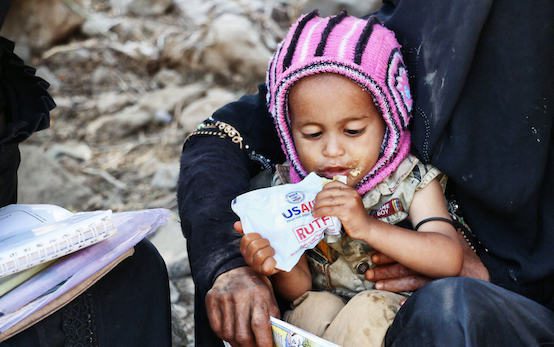Yemen’s Humanitarian Catastrophe Has Not Ended

The International Rescue Committee (IRC) spoke to several Yemeni mothers about their experience in the war and the effects that the war has had on them and their families. This is the testimony of a mother named Nadia:
The plane shelled close to us. We fled because we were afraid for our children … Our life was miserable even before the war … We depend on livestock. I just sold a sheep to buy flour and sugar. I do not cook anything but bread and tea … My baby was close to death a few days ago. He had fever and seizure. I was holding him and crying to my mother.
The war on Yemen has lasted for almost half a decade, and it has been a nightmare for the country’s civilian population. Millions have been driven from their homes, almost a quarter of a million have died from starvation, disease, and violence, and tens of millions are on the edge of famine. The quotes from these women are important, because they are the ones that are enduring the worst of this conflict and they are the ones who are suffering the most because of the crimes and abuses of all parties to the conflict. The rest of the world has gone back to ignoring Yemen after a brief surge in interest earlier this year, and even when there are a few reports about Yemen the voices of Yemenis are rarely included in them. This is Adeeyah’s testimony:
We witnessed death. We used to escape the shelling by hiding in the roots of the trees, airstrikes above us and Houthis’ rockets in front of us… My children used to get up at night screaming in fear… We were frequently unable to cook food due to the danger of having open gas cylinders during bombardment. I used to dream of having my own house…the war destroyed our dreams and [our] future. Now I only dream of peace and safety.
Yemeni civilians have almost no one to advocate for them. Their “legitimate” government supports the bombing campaign and economic war that kill them, and the Houthis abuse, detain, and torture those that speak out against their rule. The Saudi coalition slaughters innocent civilians with bombs and starves them with a blockade. The world’s major powers are either complicit in the war crimes committed against the people, or they are indifferent. As we know, our government is deeply complicit and shares responsibility for the horrors that have been unleashed upon Yemen. Were it not for the ongoing work of aid groups and human rights organizations and the work of committed journalists, there would be no one to tell the world what is being done to these people. We owe it to the people of Yemen to listen to them and to rein in our own government. The House Democratic leadership completely failed to do this when they caved in to the White House in negotiations over the defense authorization bill:
Sen. Bernie Sanders (I-Vt.) and Rep. Ro Khanna (D-Calif.) said “Voters would be appalled to know that instead of seizing the opportunity to end illegal U.S. participation in the horrific Saudi-led bombings of Yemen, Congress will continue to fund Trump’s unconstitutional war, which threatens to kill 24 million Yemenis facing starvation and disease.”
Except for the diligent work of aid groups like the IRC, Yemen’s humanitarian crisis has gone back to being virtually invisible to the outside world, but that is not because it has improved or abated in the least. In addition to the many other outbreaks, there has been an outbreak of dengue fever this year. Reuters reports:
Dengue is the world’s fastest-spreading mosquito-borne disease. It causes flu-like symptoms and a severe form of it can result in internal bleeding. There is no specific treatment and no vaccine available yet although one is being trialled.
Dengue infections around the world have increased dramatically in recent decades and many countries are seeing a surge in cases this year. The World Health Organization (WHO) this year named dengue one of the top 10 global public health threats.
Medical staff in Yemen said the disease is thriving among crowded populations of people displaced and weakened by war living in unsanitary conditions.
“You’ll find an entire camp of 600-700, all with dengue,” said Makiah al-Aslami, a nurse in Hajjah who spends most of the year treating acutely malnourished children.
There have been almost 60,000 cases of dengue in Yemen this year, and there will likely be many more in the new year. This is just one more disease to make the world’s worst humanitarian crisis even worse than it already was. The IRC report notes that half a million more Yemenis are expected to die in the next two years according to U.N. estimates:
The United Nations estimates 500,000 more Yemenis will die if fighting lasts until 2022, including 300,000 from hunger and/or lack of health care.
For more than four and a half years, the U.S. has fueled and enabled this appalling war. Congress has failed to put a stop to it, and the administration has shamefully fought to keep the war going. The public has to demand that our political leaders end this indefensible policy of supporting the war on Yemen, and we need to insist on aiding the people whose country our government has helped to destroy.
Comments